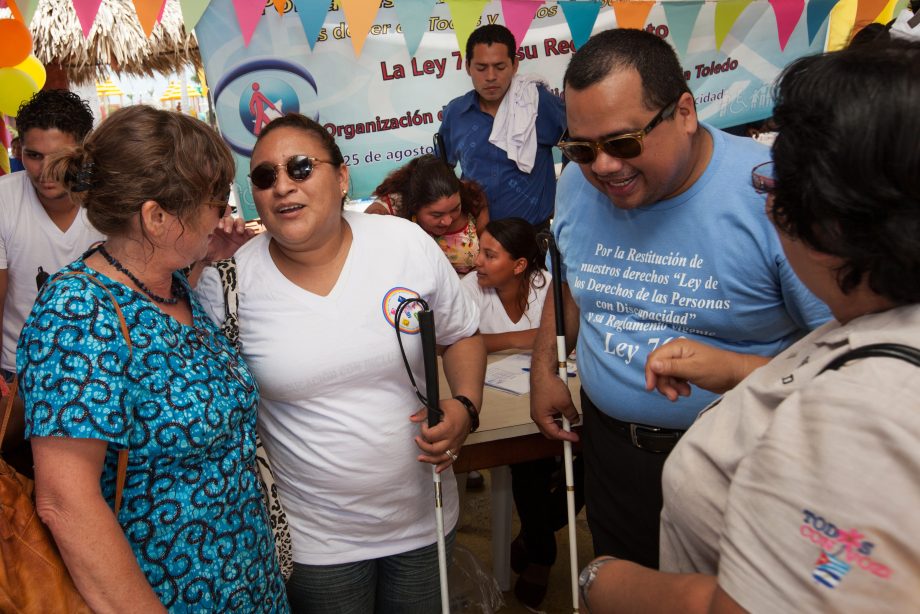Participation of Organisations of Persons with Disabilities (OPDs) in inclusive education in Nicaragua
- Location
- Nicaragua
- Project type
- Inclusive education
This case study highlights the benefits of stakeholder participation, particularly Organisations of Persons with Disabilities (OPDs), in development, using the example of an inclusive education project in Nicaragua supported by CBM. The project working with the community based inclusive development approach has continuously evolved since its beginnings in 2007 and has since expanded OPD involvement as a key factor of success.
In Nicaragua, the different actors agree on the importance of inclusive education. The project implemented by the CBM partner organisation ASOPIECAD (Asociación de Programas Integrales de Educación Comunitaria Astrid Delleman) contributed to an environment in which children were able to go to regular public schools together with their peers. The project promoted the exchange of parents of children with and without disabilities and led to the establishment of self-help groups. These kinds of parents’ initiatives are very important as they contribute towards encouraging other parents of children with disabilities to send their child to school and as we know, advocating for the rights of their children at the political level is much more impactful when done collaboratively.
During the project, an alliance of early childhood education actors was formed, with the participation of the Nicaraguan Ministries of Education, Health and Social Affairs.
The alliance provided space for regular exchange between these ministries.
Collaboration and information exchange
In 2013, the Ministry of Education, Ministry of Health, CBM’s partner ASOPIECAD, and the Nicaraguan Federation of Associations of People with Disabilities conducted two forums where the Ministries of Education and Health shared their statistics on school-aged persons with disabilities under 18 years of age.
The statistics revealed that the Ministry of Education had recorded 11,000 students with disabilities enrolled in special and mainstream schools. The Ministry of Health, however, had statistics indicating that there were 25,000 children under 18 with disabilities.
Using the two sets of data, it became clear that 56% of school aged children with disabilities were not actually in school. The figure may well have been higher, since the Ministry of Health’s statistics only counted those children who had already been identified as having disabilities.
As a result of these eye-opening statistics, both Ministries committed to sharing their information with the municipalities and to implementing a joint plan of action to gradually reduce the numbers of out-of-school girls and boys with disabilities.

OPDs contribute to improving the quality of pre-service teacher training
While there is a consensus in Nicaragua on the importance of inclusive education, teachers are wondering whether they will be able to implement inclusive education. Without proper training, the task to provide quality education to children with disabilities in regular schools can become impossible to complete.
As an alternative to the more theoretical training programs for teachers offered by the government, the Ministry of Education became aware of an initiative of the Nicaraguan Organisation of the Blind (Organización de Ciegos en Nicaragua Marisela Toledo, OCN). With the support of CBM, OCN was implementing a program that supports the practical preparation of future teachers. OCN members (persons who are blind) visit different teacher training centres (colleges) to provide capacity building and awareness training of students in subjects they would need: in-practice lecturing to blind students on how to use Braille, abacus work, orientation and mobilization.
The Ministry of Education signed an agreement which is now being implemented in institutions for pre-service teacher training for public schools.
As the intervention of OCN in the pre-service training of the government focussed on learners who are blind, a project plan was developed under the leadership of ASOPIECAD which would involve OPDs representing other groups of persons with disabilities in the pre-service teacher training of the government. Apart from OCN, partners in this project are ANSNIC (Asociación Nacional de Sordos de Nicaragua), a Nicaraguan organisation of persons who are deaf or hard of hearing, and Asnic (Asociación Nicaragüense para la Integración Comunitaria), an organisation for community inclusion in Nicaragua, working with families of persons with intellectual disabilities. The objective of the project is to achieve inclusive quality education for all children, adolescents and adults in Nicaragua, including by advocating to the government.
This project is supported by CBM and the German Federal Ministry for Economic Cooperation and Development (BMZ) and is in implementation now.
Participation and collaboration are key for inclusion!
Katharina Pfortner: Interview with David Lopez, President of the OCN: Blind People´s Organization of Nicaragua (Organización de Ciegos de Nicaragua Marisela Toledo) and Coordinator of the National Cabinet of Persons with Disabilities (Consulting the government). Managua 17. 10. 2014
Updated information from June 2022